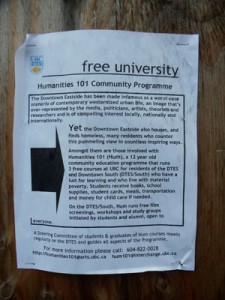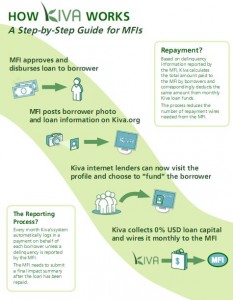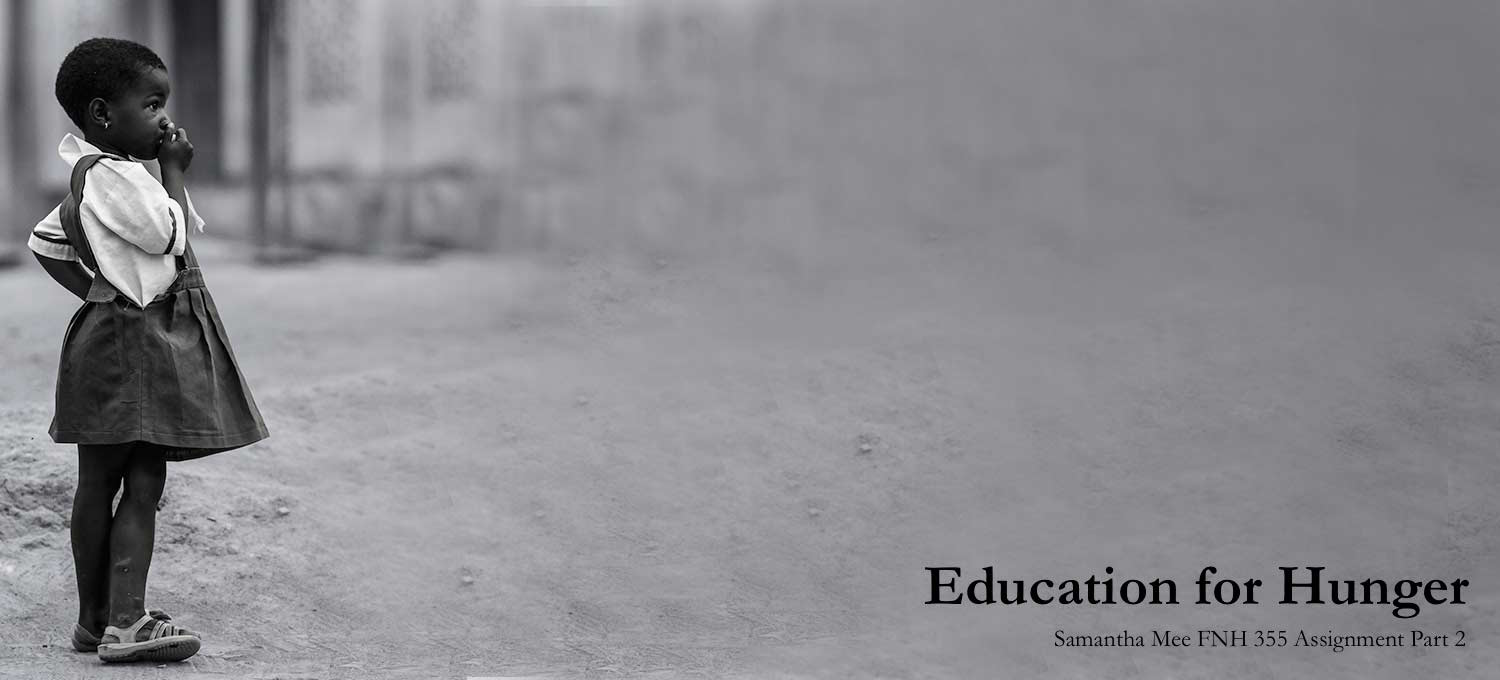The original two actions outlined in my proposal consisted of donating to the Greater Vancouver Food Bank Society and to the micro-loan organization Kiva. My hopes were to address the issue of world hunger at both a domestic and international level. Only one of my original actions, which was to donate to Kiva, was carried out; I changed my second action based on a personal experience that occurred shortly after the proposal was handed in. I was walking home from school when I witnessed someone shoplifting from the local grocery store. He was young, his arms brimming with food as he ran through the parking lot. A security guard chased after him, however, the man was not caught. The other witness to the scene was a social worker who worked in the Downtown Eastside (DTES) for a number of years. He explained to me that he has seen this fair bit, where people shoplift to sell the goods at a reduced price in the DTES. While I don’t know for certain what the reason for shoplifting was, I did feel disheartened to witness the man stealing the grocery goods. It was equally as heartbreaking to see that the grocery store had security in place to prevent this from occurring.

Based on this experience, I chose to donate to a program internal to the University of British Columbia. More specifically, I chose to donate to Humanities 101, a free program run by the university that is offered to those located in the DTES. Upon completion of the program, students are presented with a certificate and a letter of reference from a professor, which can be used when applying for jobs. The Downtown Eastside is characterized as being one of Canada’s poorest postal codes (Kumagai, 2010); a count conducted in 2014 in the Metro Vancouver area found 2,777 homeless people in the city. The chaotic environment of this poor urban area, coupled with the lack of investment in proper support, means that individuals in this region lack access to primary health care and are also confronted with food insecurity (Kumagai, 2010). The McCreary Centre Society, a nonprofit organization with the goal of improving the health of BC youth, states that those who are homeless need a tailored program that will allow them to acquire beneficial employment skills (Murphy, 2002). It is for this reason that I chose to donate to Humanities 101 Fund. With roughly 700 graduates already, I hope that the funds donated will pave the path for someone to receive an education and ultimately find work, an opportunity that they might otherwise not have had. Additionally, it is my belief that education plays a vital role in breaking the world hunger cycle. By providing the funds for someone to be educated, I hope this will better their chances of finding work and address any concerns of malnutrition.

As previously mentioned, I did carry out one of my original actions, which was to donate to the micro-loan organization known as Kiva. More specifically, I provided a loan for a women in Lebanon, who desires a loan to go towards her school tuition fees. Her story resonated with me as she wrote that her main aim was to provide for her children and her best chance at this was through education. I chose to donate to someone in Lebanon, because similar to other developing countries, it has been hit hard by political unrest and civil war. The repercussions of civil wars extend to post-war periods; governments allocate scarce resources to redevelop the economy, sacrificing education as a result (Tfaily et al., 2013). In light of this, hunger, disease and poverty are all characteristic consequences that arise from these particular socioeconomic issues (Hong et al., 2007). Furthermore, studies have found that approximately 46% of women in Lebanon have received less than secondary education (Tfaily et al., 2013). This becomes an issue as it has been found that the probability of a child being malnourished can be reduced by 40%; this number is dependent on the number of years a mother has attended school (Manning et al., 2007).
Both cases above have demonstrated the vitality of education. It shows how fundamental education is towards breaking the cycle of malnutrition and poverty, and this is why I chose education as the primary focus of my assignment.
Check out what UBC’s former president, Stephen Toope, had to say about the Humanities 101 fund.
Literature Cited
Hong, R., Mishra, V., & Michael, J. (2007) Economic disparity and child survival in Cambodia. Asia Pacific Journal of Public Health, 19(2), 37-44.
Kumagai, J. (2010) Vancouver’s downtown eastside: A community in need of balance. Vancouver: Strathcona Business Improvement Association Ray-Cam Community Association.
Manning, M., & Patterson, J. (2007) World hunger series 2006: Hunger and learning. Olney: Association for Childhood Education International.
Murphy, A., & McCreary Centre Society. (2002). Between the cracks: Homeless youth in Vancouver. Burnaby, B.C: McCreary Centre Society.
Tfaily, R., Diab, H., % Kulczycki, A. (2013). Educational disparities and conflict: Evidence from Lebanon. Research in Comparative and International Education, 8(1), 55.
